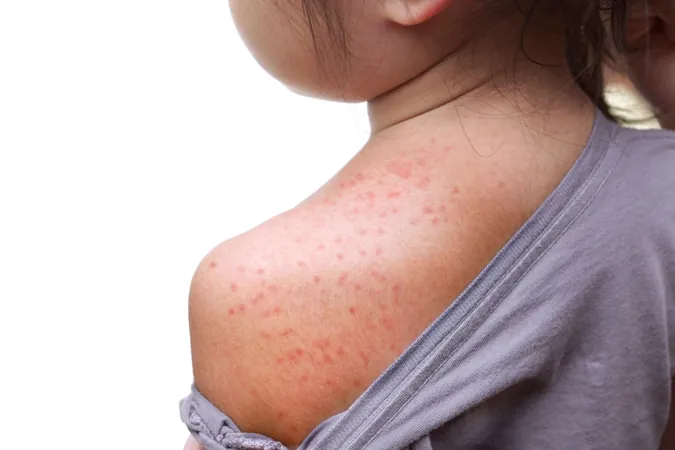
Measles Misinformation: A Concerning Trend Endangering Public Health
2025-04-08
Author: Emma
Measles Misinformation: A Concerning Trend Endangering Public Health
In recent months, the spread of misinformation surrounding measles has created alarm within communities, particularly in Ontario. The Simcoe Muskoka District Health Unit (SMDHU) and various public health agencies are tirelessly working to combat this false narrative, using established scientific facts to keep the public informed and safe during dangerous health events like the current measles outbreak.
On March 19, the health unit reported a confirmed case of measles in the community, which subsequently led to three additional cases within the same household. Another unvaccinated resident who had traveled internationally reported a second separate case on April 2. These incidents highlight the very real threat of measles, a highly contagious virus that can circulate swiftly in populations with low vaccination rates.
Despite the serious nature of these outbreaks, misinformation has proliferated on social media platforms. Comments that undermine the dangers of measles — such as “No one dies from measles” and “Measles is just a minor illness” — have been alarmingly prevalent. However, scientific evidence underscores the severe risks associated with this virus.
Measles is one of the most contagious viruses known, spread through the air when infected individuals cough or sneeze. It can linger in the air for up to two hours, posing a risk to anyone unvaccinated in the vicinity. In fact, approximately 90% of unvaccinated individuals exposed to the virus will contract it. The virus can also be spread by touching contaminated surfaces and then touching one’s face.
Symptoms typically appear between seven to 21 days after infection, starting with fever, cough, runny nose, and red eyes, followed by a characteristic red rash. Complications can be severe, leading to hospitalization in about one in five unvaccinated persons. Complications include pneumonia, encephalitis, and in rare cases, death. Particularly concerning is the fact that pregnancy complications can arise as well, risking premature birth or low birth weight in infants.
The global situation remains dire; despite successful vaccination campaigns reducing mortality from approximately 800,000 deaths annually in 2000 to around 100,000 deaths today, many of these fatalities are predominantly among unvaccinated children in lower-income nations.
Another false narrative is that measles is commonplace in Canada. However, measles was declared eliminated in the country in 1998 thanks to high vaccination rates. Unfortunately, misinformation and the disruptions caused by the pandemic have led to a decline in immunization rates, exposing populations to outbreaks. In 2023, Ontario reported an unprecedented rise in measles cases, prompting urgent vaccination campaigns to counteract declines in protection against this highly contagious virus.
Misleading claims also circulate regarding vaccine efficacy. The reality is that both children and adults can contract measles, with a staggering percentage of affected individuals being unvaccinated — 92.6% of children and 64.3% of adults in recent outbreaks were not immunized. The measles vaccine, available since 1963, has been proven to be incredibly effective. One dose provides 85–95% protection, while two doses can offer nearly complete immunity.
Some individuals falsely assert that vaccines can cause autism. Scientific studies consistently debunk this myth, tracing its origins to a discredited 1998 paper that was withdrawn due to misconduct. There is no credible evidence linking the measles vaccine — or any other vaccines — to autism. The increase in autism diagnoses in recent years can be attributed to better awareness and changing diagnostic criteria.
In a world inundated with conflicting information, distinguishing fact from fiction is crucial. Reliable sources, such as Health811, SickKids, and the Canadian Paediatric Society, can provide evidence-based information. When in doubt, consulting healthcare providers is always a wise choice.
As the measles outbreak continues, understanding the importance of vaccinations and reliable health information is essential for protecting the community. For more on measles and immunization, visit the Simcoe Muskoka District Health Unit's website at smdhu.org/Measles.
This ongoing public health saga serves as a reminder of the essential role of accurate information in safeguarding health and well-being in our communities.









 Brasil (PT)
Brasil (PT)
 Canada (EN)
Canada (EN)
 Chile (ES)
Chile (ES)
 Česko (CS)
Česko (CS)
 대한민국 (KO)
대한민국 (KO)
 España (ES)
España (ES)
 France (FR)
France (FR)
 Hong Kong (EN)
Hong Kong (EN)
 Italia (IT)
Italia (IT)
 日本 (JA)
日本 (JA)
 Magyarország (HU)
Magyarország (HU)
 Norge (NO)
Norge (NO)
 Polska (PL)
Polska (PL)
 Schweiz (DE)
Schweiz (DE)
 Singapore (EN)
Singapore (EN)
 Sverige (SV)
Sverige (SV)
 Suomi (FI)
Suomi (FI)
 Türkiye (TR)
Türkiye (TR)
 الإمارات العربية المتحدة (AR)
الإمارات العربية المتحدة (AR)